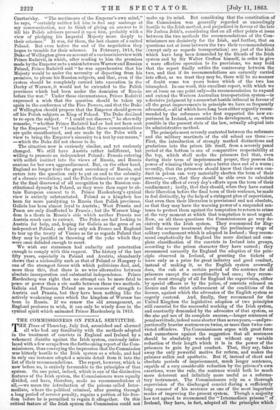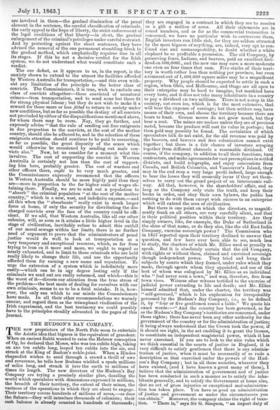THE COMMISSIONERS ON PENAL SERVITUDE.
THE Times of Thursday, July 2nd, astonished and alarmed all who had any familiarity with the methods adopted in the treatment of convicts in England and Ireland by a vehement diatribe against the Irish system, curiously inter- laced with a few scraps from the forthcoming report of the Com- missioners, thus conveying the impression that the Commission was bitterly hostile to the Irish system as a whole, and had in only one instance adopted a minute detail from it into the list of their recommendations. The report, however, which is now before us, is entirely favourable to the principles of that system. On one point, indeed, which is one of the distinctive features of the Irish system, the Commissioners were equally divided, and have, therefore, made no recommendations at all,—we mean the introduction of the prisons called Inter- mediate, where the political criminal, after passing through a long period of severer penalty, regains a portion of his free- dom before he is permitted to regain it altogether. On. this critical feature of the Irish system the Commission could not make up its mind. But considering that the constitution of the Commission was generally regarded as exceedingly hostile to the Irish method, and prejudiced in favour of the late .
Sir Joshua Jebb's, considering that on all other points at issue between the two methods the recommendations of the Com- missioners are decisively for the Irish, and further, that on questions not at issue between the two their recommendations (except only as regards transportation) are just of the kind which have long been demanded by the friends of the Irish system and by Sir Walter Crofton himself, in order to give a more effective operation to its provisions, we may hold that the report finally settles the controversy between the two, and that if its recommendations are earnestly carried into effect, as we trust they may be, there will be no manner of doubt some ten years hence which of the two has triumphed. In one word, this excellent report, with which we are at issue on one point only—its recommendation to expand and extend the Western Australian transportation system—is a decisive judgment by a somewhat hostile tribunal in favour of all the great improvements in principle we have so frequently advocated, — all of which have long been either urgently recom- mended by the reformers who first supported the new ex- periment in Ireland, as essential to its development, or, where possible in the present state of the law, actually adopted into its administrative method.
The principles most severely contested between the reformers and the military martinets of the old school are three :- First, the introduction of strongly marked distinctions and gradations into the prison life itself, from a severely penal period at the bottom to one of comparative respectability at the top, which shall make the prisoners feel that, even during their term of imprisonment proper, they possess the power of winning their way into a better class out of a worse ; secondly, that the prisoners should know that their own con- duct in prison can very materially shorten the term of their sentence,—nay, that they should be able even to calculate directly the effect of every day's efforts upon the term of their confinement ; lastly, that they should, when they have earned their liberation before the final term of their sentence, be made to feel distinctly, by the help of a stringent plan of supervision, that even then their liberation is provisional and not absolute, so that they may have the warning power of a suspended sen- tence to protect them against the temptation to return to crime at the very moment at which that temptation is most urgent. Now, on all these questions the Commissioners go very de- cisively with the Irish system. They recommend for Eng- land the severer treatment during the preliminary stage of solitary confinement which is adopted in Ireland ; they recom- mend emphatically for England the more distinct and com- plete classification of the convicts in Ireland into groups, according to the prison character they have earned ; they recommend earnestly for England the adoption of the prin- ciple observed in Ireland, of granting the tickets of leave only as a prize for great industry and good conduct, instead of making it, as the English system avowedly does, the rule at a certain period of the sentence for all prisoners except the exceptibnally bad ones ; they recom- mend most strongly of all for England the supervision, either by special officers or by the police, of convicts released on licence and the strict enforcement of the conditions of the licence, against which the advocates of the English system so eagerly contend. And, finally, they recommend for the United Kingdom the legislative adoption of two principles still essential for the successful working of the Irish system, and constantly demanded by the advocates of that system, as the sine qud non of its complete success,—longer sentences of penal servitude, indeed none shorter than seven years,—andpro- portionally heavier sentences on twice, or more than twice con- victed offenders. The Commissioners argue with great force and earnestness against the suggestion that all sentences should be absolutely worked out without any variable reduction of their length which it is in the power of the prisoners to gain by good conduct. That, they say, takes away the only powerful motive for reform, and makes the prisoner sullen and apathetic. But if, instead of short and absolute periods of imprisonment, much longer sentences, capable of a very considerable reduction by the prisoner's own exertions were the rule the sentence would both be much more deterrent and infinitely more useful as a reforma- tory instrument. The Commissioners rely on a thorough supervision of the discharged convict during a sufficiently long remanet of his sentence as one of the most important modes of improving the present system. Though a majority has not agreed to recommend the "Intermediate prisons" of Ireland, they have, in fact, adopted all the principles which are involved in them—the gradual diminution of the penal element in the sentence, the careful classification of criminals, the early appeal to the hope of liberty, the strict enforcement of the legal conditions of that liberty—in short, the gradual enlargement of the criminal's privileges under careful restraint. And by protesting against the short sentences, they have advised the removal of the one permanent stumbling .block in the gradual method, which emphatically requires time in all its stages. If this be not a decisive verdict for the Irish system, we do not understand what would constitute such a verdict.
The one defect, as it appears to us, in the report, is the -anxiety shown to extend to the utmost the facilities afforded by Western Australia for transportation,—and this even with- out any limitation of the principle to the better class of 'convicts. The Commissioners, it is true, wish to exclude one -class of convicts altogether—those convicted of unnatural -crimes—from transportation, and to send none but those fit for strong physical labour ; but they do not wish to make it a reward for those more or less fitted to return to society under new conditions, but as far as possible the destiny of all convicts not precluded by either of the disqualifications mentioned above, for whom there may be room. Nay, they go further, and -expressly advise "that the rule of sending out free emigrants in due proportion to the convicts, at the cost of the mother country, should also be adhered to, and in the selection of these emigrants attention should continue to be paid to correcting, as far as possible, the great disparity of the sexes which would otherwise be occasioned by sending out male con- victs also." Now, let us consider for a moment what this involves. The cost of supporting the convict in Western Australia is certainly not less than the cost of support- ing him here, probably greater. The cost of warders and other officers there, ought to be very much greater, and the Commissioners expressly recommend that the officers in Western Australia should be more highly paid than they are—more in proportion to the far higher scale of wages ob- taining there. Finally, we are to send out a population to 4.` absorb" the criminal population "at the cost of the mother country," which is a new, vast, and indefinite expense,—and all this when the " absorbents " really exist in much larger force at home, if only the security for distributing the dis- charged convicts over the face of the country could be effi- cient. If we add, that Western Australia, like all our other colonies, will, so soon as it attains a little higher level in the stage of civilization, inevitably refuse to admit this outfall of our moral sewage within her limits, there is no further need of argument to prove that the administrators of penal justice would do well. to look at transportation as a very temporary and exceptional resource, which, so far from trying to lean on it more and more, we ought to regard as nearly exhausted, and to limit to those criminals who are held really likely to change their life, and use the opportunity afforded them for earning a new name and reputation. To urge the extension of a system which is indefinitely more costly—which can be in au degree lasting only if the criminals we send out are really reformed, and which—this is the worst of it—diverts our attention from the true stress of the problem—the best mode of dealing for ourselves with our -own criminals, seems to us to be a fatal mistake. It is, how- ever, the only one which to our minds the Commissioners have made. In all their other recommendations we warmly 'concur, and regard them as the triumphant vindication of the Irish experiment, and the best testimony we could possibly have to the principles steadily advocated in the pages of this journal.




































 Previous page
Previous page